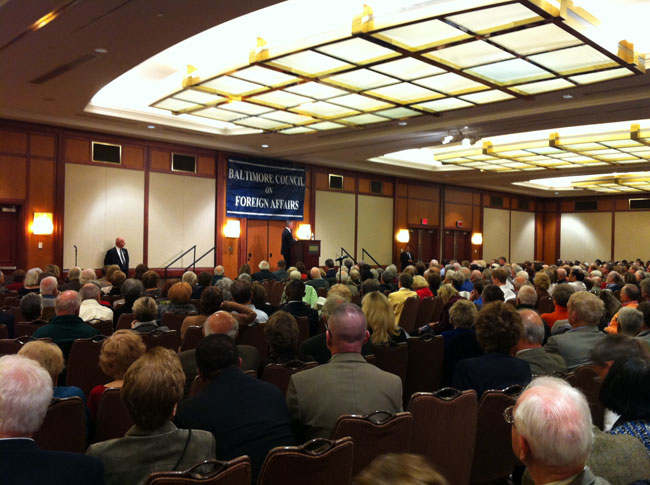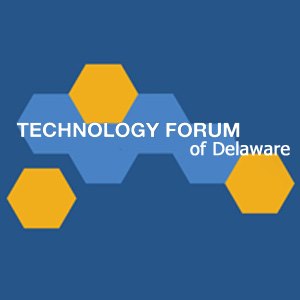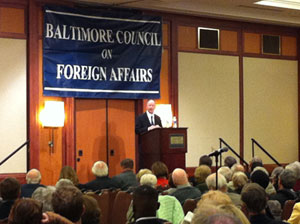On Thursday night Max Obuszewski was outside the Hyatt Regency on Light Street, but he wasn’t there waiting his turn to enter the hotel in order to listen to NSA director Gen. Keith Alexander speak.
Holding a makeshift sign, he and a handful of other protestors were there trying to hold the National Security Agency to account. Since June, articles published in the UK newspaper The Guardian and the Washington Post have revealed intimate details about the NSA’s vast, worldwide surveillance network through which one agency of the United States’ intelligence infrastructure collects phone records and online metadata.
Only recently it was reported that the NSA was recording the phone conversations of German chancellor Angela Merkel. And this week, the Post reported that the NSA, through a program called MUSCULAR, “has secretly broken into the main communications links that connect Yahoo and Google data centers around the world.”
“We see this as a criminal organization, and these revelations only confirm it,” said Obuszewski, who describes himself as a peace activist working in Baltimore since 1983.
Given the atmosphere of controversy surrounding the agency Alexander has been in charge of since 2005, the audience of a few hundred might’ve been surprised at his wisecracking during his roughly 40-minute address and half-hour Q&A session. (They might have also been surprised that no one was checking the contents of bags at the doors.) Invited by the Baltimore Council on Foreign Affairs — tickets for non-members were $25 — to give a talk on “cyber challenges,” Alexander joked at one point that he hoped his speech “isn’t being recorded.” It was, naturally: CNN, as well as other news networks, had cameras set up in the back of a second-floor ballroom inside the Hyatt.
Alexander didn’t take long cutting to the chase. “I am not wed to these programs,” he said, referring to the NSA’s bulk data collection efforts. During the Q&A he would say that the NSA does not engage in “targeted collection against a company” or U.S. citizens.
But he also got quickly to condemning whistle-blower Edward Snowden, calling him and unnamed others “people who stole this data,” and saying, “They’re hurting our country, hurting our industry, and they’re hurting our partnerships,” by which he meant nation-allies of the U.S.
He said that between 50,000 and 200,000 documents, many of them accessible to reporters via Snowden, are now available. “I wish there was a way to prevent it,” Alexander said, it being the dissemination of those documents and, presumably, the reporting done by journalists and news organizations about the NSA’s data collection programs.
He said that the reports about Angela Merkel’s phone being tapped — in response to a journalist’s question during the Q&A period — are factually flimsy. “I would say ‘alleged,’ ” Alexander said. “There are no facts about [the] intercept on the table.”
Alexander said that some of the NSA’s collection systems have been “mischaracterized” by the mainstream press. He said the phone records database tracks only foreign numbers — the number itself, to whom, from whom and the call’s duration — and that names, content and e-mails are stuff they “don’t need.”
 A question from Jim Rosapepe, former U.S. ambassador to Romania and now a Maryland state senator, about the national security justifications for the NSA’s far-reaching spy network elicited one of Alexander’s wisecracks: he turned the question around on Rosapepe, saying that people like ambassadors were the ones insisting the NSA increase its surveillance capabilities.
A question from Jim Rosapepe, former U.S. ambassador to Romania and now a Maryland state senator, about the national security justifications for the NSA’s far-reaching spy network elicited one of Alexander’s wisecracks: he turned the question around on Rosapepe, saying that people like ambassadors were the ones insisting the NSA increase its surveillance capabilities.A back-slapping sort of chumminess pervaded the room, which might explain what was perhaps the salient characteristic of the evening, considering the size of the audience and the time Alexander was given: while the NSA director repeatedly insisted that the NSA was not listening to people’s phone calls, reading their e-mails, or doing much of anything that has been reported by such outlets as The Guardian and the Post, he eschewed specifics, falling back instead on platitudes about the global threat of terrorism and cyber attacks and the steadfastness of his cause.
“We’re holding this hornet’s nest … and we would like to cast it aside, but if we do it is our fear that there will be a gap and the potential for another 9/11,” Alexander said.
Early in his talk, Alexander said the data mining programs of the NSA were precisely what assisted the FBI in dismantling a 2009 terror plot by Najibullah Zazi, who intended to bomb the New York City subway system.
Reporting by BuzzFeed, NPR and other outlets has shown, however, that good police work — and warrants issued via the Foreign Intelligence Surveillance Act — did more to aid in Zazi’s capture than the bulk collection of phone records and e-mails.
But Alexander remains convinced. At the beginning of his talk, he verbally saluted his compatriots at the NSA: “With everything that’s going on, they’re the real patriots. They’re the ones who act nobly.”
Dulce et decorum est, ya hear?
Companies:
U.S. Government
34% to our goal!
$25,000
Before you go...
To keep our site paywall-free, we’re launching a campaign to raise $25,000 by the end of the year. We believe information about entrepreneurs and tech should be accessible to everyone and your support helps make that happen, because journalism costs money.
Can we count on you? Your contribution to the Technical.ly Journalism Fund is tax-deductible.
Join our growing Slack community
Join 5,000 tech professionals and entrepreneurs in our community Slack today!

The looming TikTok ban doesn’t strike financial fear into the hearts of creators — it’s community they’re worried about

Protests highlight Maryland’s ties to Israeli tech and defense systems

Influencers are news distributors now: Inside Technical.ly’s Creator in Residence Program



